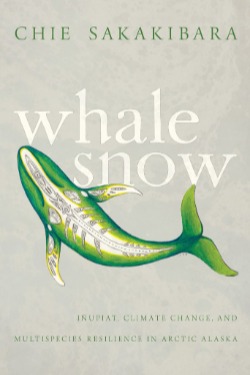Whale Snow: Iñupiat, Climate Change, and Multispecies Resilience in Arctic Alaska
Chie Sakakibara
University of Arizona Press, September 2020

As a mythical creature, the whale has been responsible for many transformations in the world. It is an enchanting being that humans have long felt a connection to. In the contemporary environmental imagination, whales are charismatic megafauna feeding our environmentalism and aspirations for a better and more sustainable future.
Using multispecies ethnography, Whale Snow explores how everyday the relatedness of the Iñupiat of Arctic Alaska and the bowhead whale forms and transforms “the human” through their encounters with modernity. Whale Snow shows how the people live in the world that intersects with other beings, how these connections came into being, and, most importantly, how such intimate and intense relations help humans survive the social challenges incurred by climate change. In this time of ecological transition, exploring multispecies relatedness is crucial as it keeps social capacities to adapt relational, elastic, and resilient.
In the Arctic, climate, culture, and human resilience are connected through bowhead whaling. In Whale Snow we see how climate change disrupts this ancient practice and, in the process, affects a vital expression of Indigenous sovereignty. Ultimately, though, this book offers a story of hope grounded in multispecies resilience.
Related News
School News

Oct 14, 2025
Commentary

Sep 18, 2025
Research

Sep 9, 2025
Commentary

Sep 9, 2025